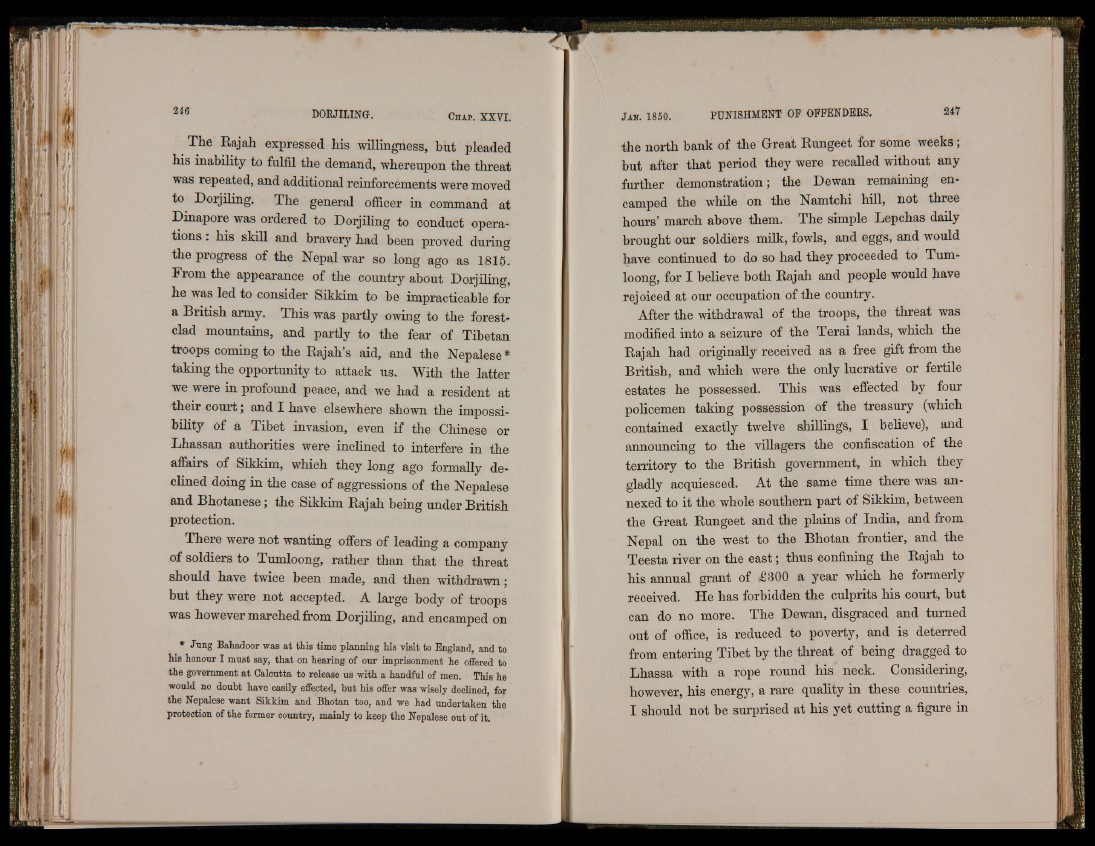
The Rajah expressed his willingness, but pleaded
his inability to fulfil the demand, whereupon the threat
was repeated, and additional reinforcements were moved
to Dorjiling. The general officer in command at
Dinapore was ordered to Dorjiling to conduct operations
: his skill and bravery had been proved during
the progress of the Nepal war so long ago as 1815.
From the appearance of the country about Dorjiling,
he was led to consider Sikkim to be impracticable for
a British army. This was partly owing to the forest-
clad mountains, and partly to the fear of Tibetan
troops coming to the Rajah’s aid, and the Nepalese*
taking the opportunity to attack us. With the latter
we were in profound peace, and we had a resident at
their court, and I have elsewhere shown the impossi-
bility of a Tibet invasion, even if the Chinese or
Lhassan authorities were inclined to interfere in the
affairs of Sikkim, which they long ago formally declined
doing in the case of aggressions of the Nepalese
and Bhotanese; the Sikkim Rajah being under British
protection.
There were not wanting offers of leading a company
of soldiers to Tumloong, rather than that the threat
should have twice been made, and then withdrawm;
but they were not accepted. A large body of troops
was however marched from Dorjiling, and encamped on
* Jung Babadoor -was at this time planning his visit to England^ an<j t0
his honour I must say, that on hearing- of our imprisonment he offered to
the government at Calcutta to release us with a handful of men. This he
would no doubt have easily effected, but his offer was wisely declined, for
the Nepalese want Sikkim and Bhotan too, and we had undertaken the
protection of the former country, mainly to keep the Nepalese out of it.
the north bank of the Great Rungeet for some weeks,
but after that period they were recalled without any
further demonstration; the Dewan remaining encamped
the while on the Namtchi hill, not three
hours’ march above them. The simple Lepchas daily
brought our soldiers milk, fowls, and eggs, and would
have continued to do so had they proceeded to Tumloong,
for I believe both Rajah and people would have
rejoiced at our occupation of the country.
After the withdrawal of the troops, the threat was
modified into a seizure of the Terai lands, which the
Rajah had originally received as a free gift from the
British, and which were the only lucrative or fertile
estates he possessed. This was effected by four
policemen taking possession of the treasury (which
contained exactly twelve shillings, I believe), and
announcing to the villagers the confiscation of the
territory to the British government, in which they
gladly acquiesced. At the same time there was annexed
to it the whole southern part of Sikkim, between
the Great Rungeet and the plains of India, and from
Nepal on the west to the Bhotan frontier, and the
Teesta river on the e a st; thus confining the Rajah to
his annual grant of ¿6300 a year which he formerly
received. He has forbidden the culprits his court, but
can do no more. The Dewan, disgraced and turned
out of office, is reduced to poverty, and is deterred
from entering Tibet by the threat of being dragged to
Lhassa with a rope round his neck. Considering,
however, his energy, a rare quality in these countries,
I should not be surprised at his yet cutting a figure in